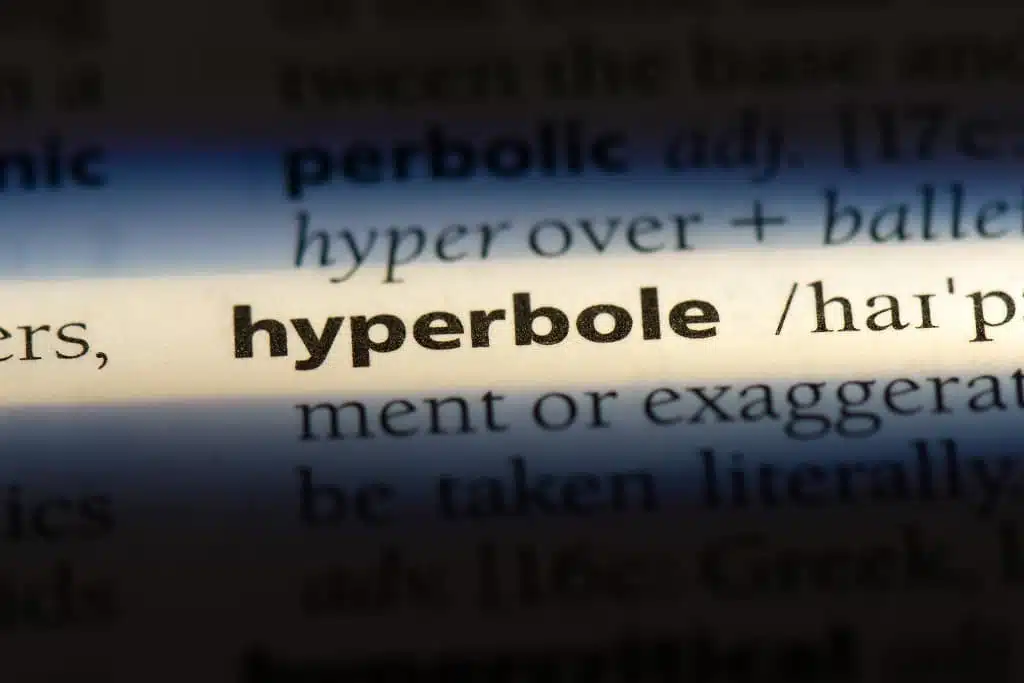Here’s the difference between hyperbole and exaggeration:
Hyperbole is the deliberate use of unrealistic exaggeration as a literary technique.
Exaggeration is typically used in daily conversations to describe something in an excessive manner.
If you want to learn more about the differences between hyperbole and exaggeration, then you’ve come to the right place.
Let’s jump right into it!

What Is the Difference Between Hyperbole and Exaggeration?

| Exaggeration | Hyperbole | |
| Usage | Daily life | Literature |
| Scale | Almost believable | Unrealistic |
| Intentions | May or may not be intentional | Always intentional; often formulaic |
| Format | Usually verbal | Usually written |
Hyperbole is essentially the use of unrealistic exaggeration as a literary technique, whereas exaggeration is a naturally occurring element of speech that we often use in our daily lives.
Both use excessive descriptors to communicate a subjective sense of scale.
Exaggeration involves expressing something so that it sounds more extreme than it actually is.
This extremity can be in terms of value, size, severity, etc.
Verbal exaggerations might fly under the radar or be extremely subtle.
Hyperbole involves utilizing unrealistic exaggeration in a literary work to greatly emphasize a point about the subject.
The keyword here is “unrealistic.”
Saying someone is as fat as a cow might be rude, but it’s not as outlandishly ridiculous as saying that the moon would orbit around their waist if they were slightly taller.
What Is Exaggeration?

Exaggeration is a part of the rhetoric we use in our ordinary daily lives.
Its purpose is to put emphasis on the adjectives or descriptors in our sentences so that we can communicate that we consider something to be especially true or of some enhanced significance.
When using exaggeration, we tend to immediately understand the figurative meaning rather than the literary meaning.
We know that no one is actually as fat as a cow, but it’s understood that the exaggeration really just means the person is “very fat.”
Due to its frequency of use, it’s not uncommon for exaggeration to be completely accidental.
Even when it’s used on purpose, we typically wouldn’t refer to verbal expressions of exaggeration as hyperbole since they’re not part of a literary work.
Some of the most basic examples of exaggeration involve speaking in absolutes.
When you say something ‘always’ or ‘never’ happens, you are usually inherently using exaggeration as a result, because of how unlikely it is for something to have a 100% or 0% rate of occurrence.
Words like ‘best’ and ‘worst’ also lend themselves to exaggeration.
Comparisons are another way to exaggerate.
Calling someone as slow as a snail, as pretty as an angel, or as flat as a board is all purposeful exaggerations, meant to express emphasis.
Note that exaggeration is frequently used in corporate slogans, jingles, and advertising in general.
It lends itself well to marketing since it allows the company to make a statement that implies a greater value than is really offered, without technically being false advertising since it’s obviously not meant to be taken literally.

Exaggeration also pops up in politics and public speaking fairly often, since being able to emphasize a point without actually providing any further facts or statistics is a valuable way to sound informative without actually being informative.
Essentially, politicians often use exaggeration as fluff to pad out their speaking time when they run out of things to say about something.
“We’re going to make this country the best in the world, better than anyone else. We’ll have the best schools and the best streets and the best economy. I won’t stop until everything we have is as good as you deserve.”
If you study the above paragraph closely, you’ll realize it doesn’t actually have any information in it.
How is “better” actually defined by the speaker?
What are they going to actually do to achieve this undefined “better” state?
This kind of exaggerative rhetoric in public speeches is extremely common and easy to find after you train yourself to look for it.
Whether exaggeration in marketing and public speeches counts as hyperbole or not depends on whether you perceive them as “literary” usage.
The line between exaggeration and hyperbole is actually very blurred in practice since hyperbole is ultimately just unrealistic and intentional exaggeration in a literary context.
Examples of Exaggeration:
- “You always say you’re going to do that.”
- “You never listen to me.”
- “I’m so hungry, I could eat a horse.”
- “He’s as tall as a tree!”
- “It looks like a tornado made this mess.”
- “I could kill him for that!”
- “All this work will be the death of me.”
- “That’s the worst painting I’ve ever seen.”
- “We were dying of thirst.”
- “It was hotter than the sun that day.”
What Is Hyperbole?

Hyperbole is the strategic use of unrealistic exaggeration in literature.
Whereas exaggeration has just been a natural evolution of human speech, hyperbole is a literary device that employs purposely unnatural levels of exaggeration to really hammer a point.
Hyperbole is typically not meant to be taken literally.
The exaggerations get so out of hand and ridiculous that it’s implied that they couldn’t possibly represent the literal truth.
It might be used strictly to enhance imagery, by creating a vivid and extreme version of the central image, or it might be played for comedic effect by going so over the top that it completely dwarfs the original statement.
Unlike exaggeration, hyperbole is always done on purpose.
It’s a conscious decision by the writer to utilize elements of description that would normally be wildly inappropriate for the actual scale of the subject matter.
In fact, hyperbole often has a formulaic structure.
Typically the exaggeration will start with a statement of the literal intent and will then spiral off into a ridiculous description that decorates the statement for emphasis, sometimes over many clauses or full sentences.
The longer and wilder the use of hyperbole is, the further it veers toward comedic usage, playing up the emphasis on entertainment value.
Examples of Hyperbole:
“Her eyes shone like a star, brilliant and beaming with the light of God, her pure soul burning out from them like the ancient fires of the forge of Hephaestus, melting away my trepidation as if it had only ever been the idle whimpering of a child.”
You could condense the entirety of the above statement as: “She had pretty eyes.”
This is one easy way to identify hyperbole in some cases.
If the whole of a long sentence can be reduced to just a few words and still have the same literal meaning, then the rest is likely evidence of hyperbole.
As you can imagine, hyperbole is quite popular in love poems and romance novels, since attraction is notoriously difficult to portray in simple terms.
“The whole of the crumbling mansion loomed over me, dilapidated as though it had always been there. Surely it had stood since millions of years before the disappearance of Roanoke, stoically waiting for some caveman to stumble upon it.”
This example basically just shortens to: “The mansion was old.”
It is of course ridiculous to assert that a large mansion had stood since the era of cavemen, but by jokingly announcing that it most certainly had to have been that old, we establish a greater sense of just how ancient the building feels to the narrator.
“He was dumb. We’re talking five fingers in the oven dumb. Trying to push open the door to a refrigerator dumb. Geocentric model of the universe dumb.”
This one gives us the bottom line right away, then expands on it to comedic effect.
The literal meaning of the passage should be fairly obvious, but the narrator in this instance is determined to assert a level of stupidity that three words can’t adequately capture.
The result is both humorous and informative, giving us a clear indication of how negative the narrator’s impression of the character is.
